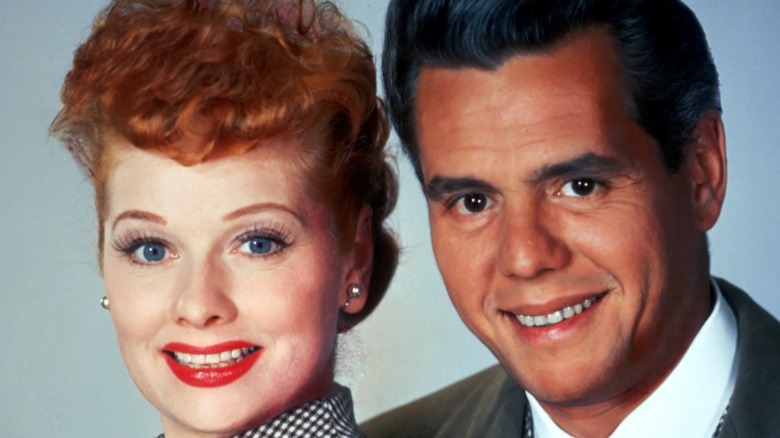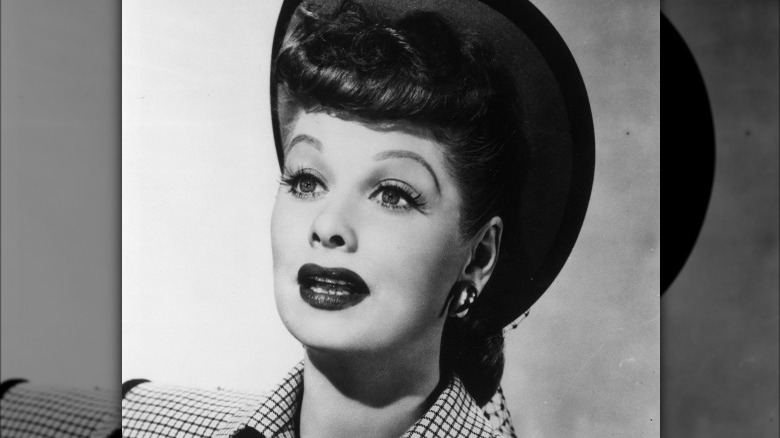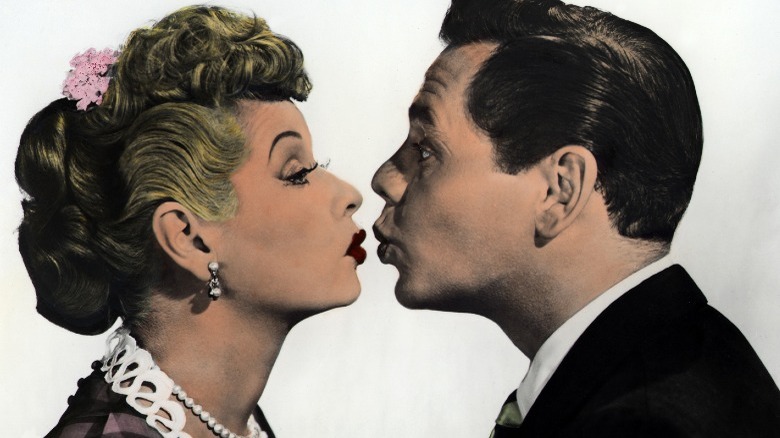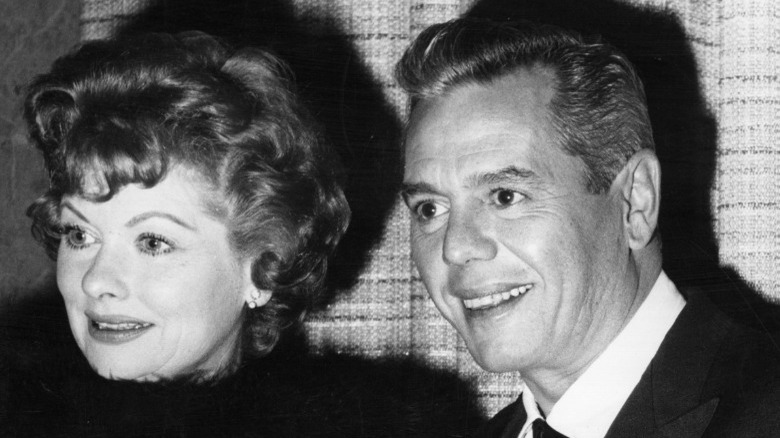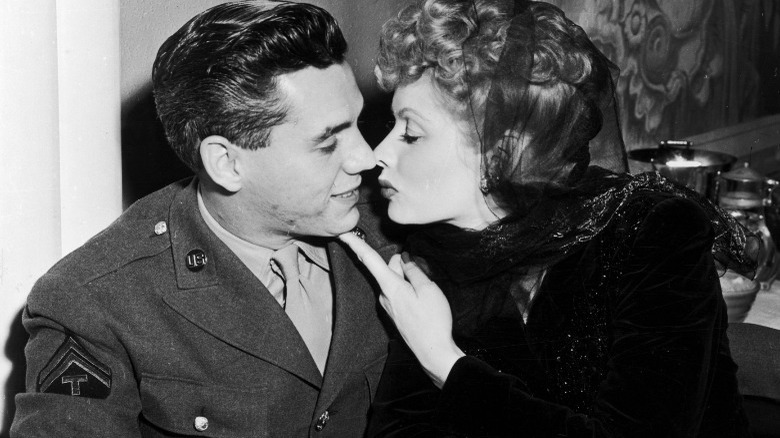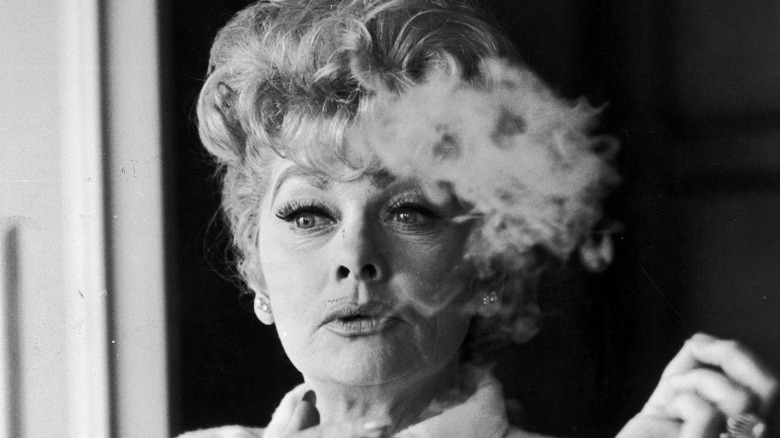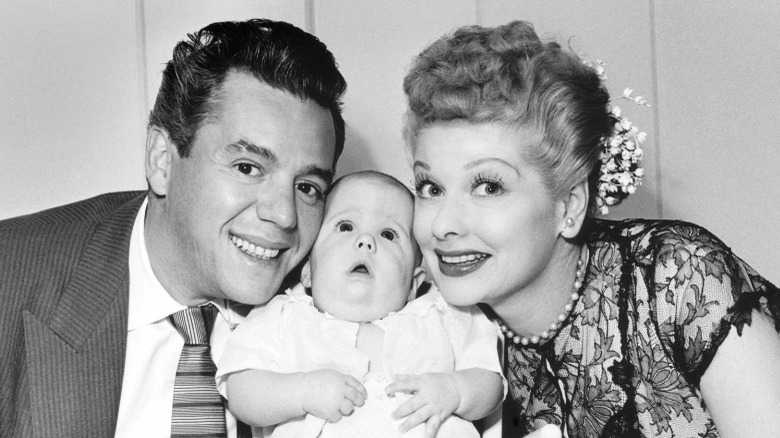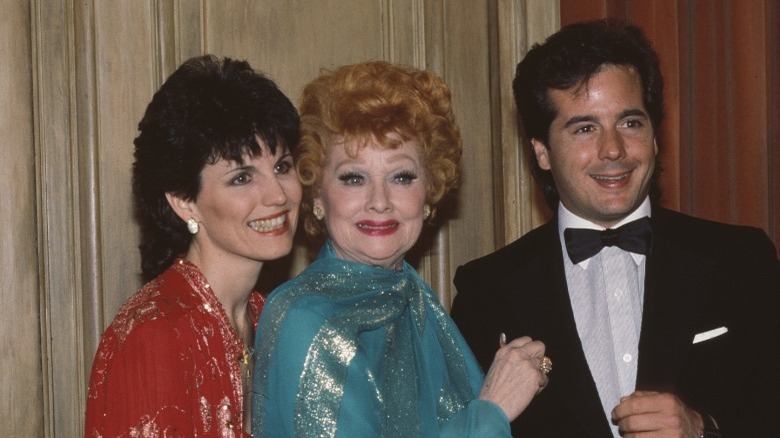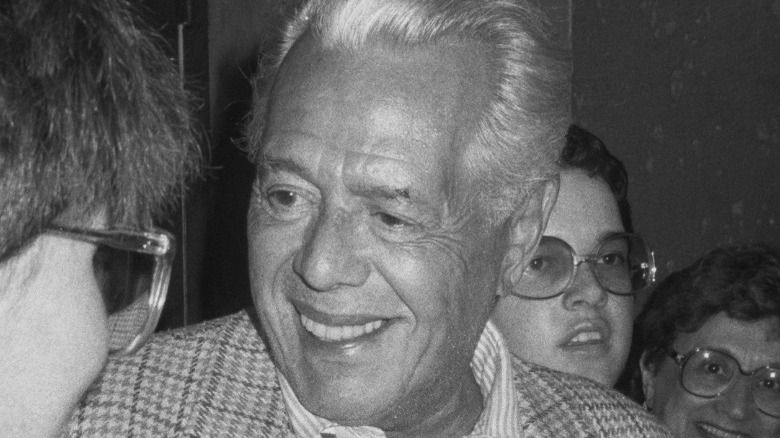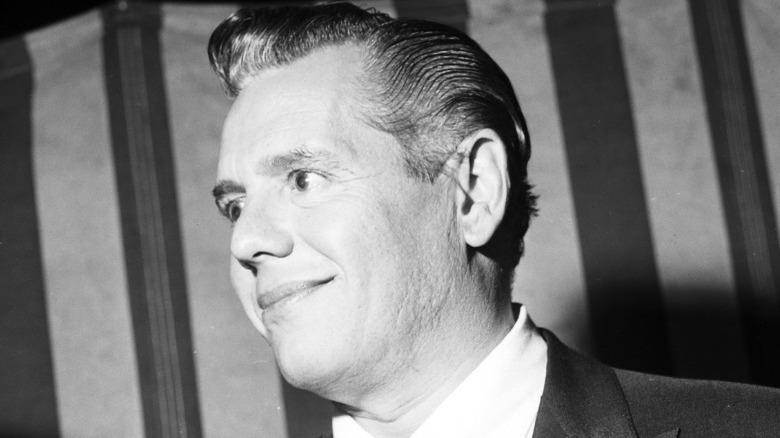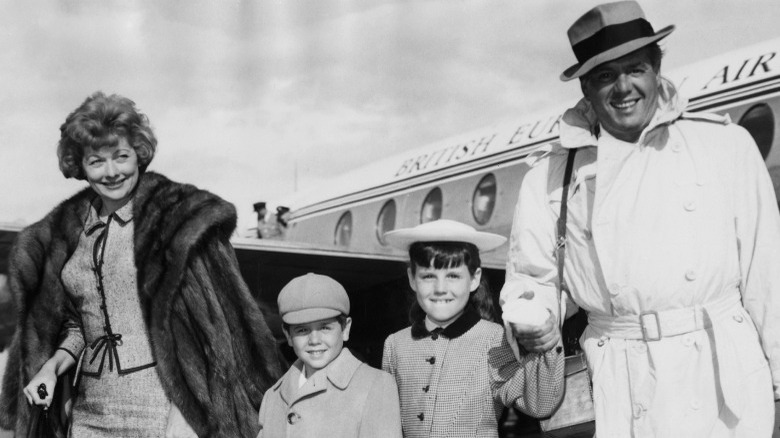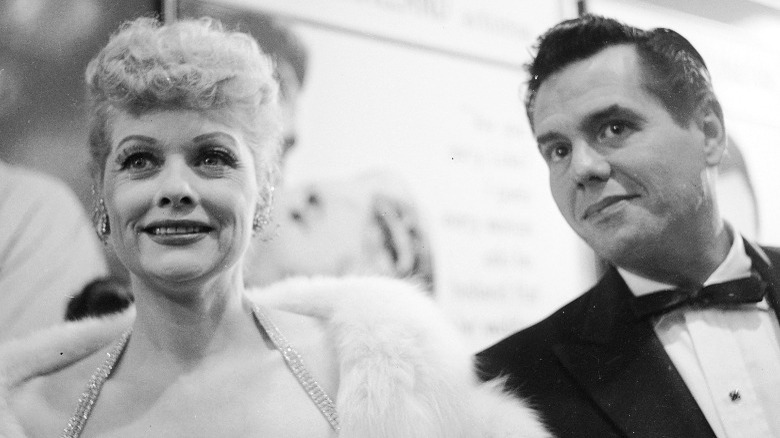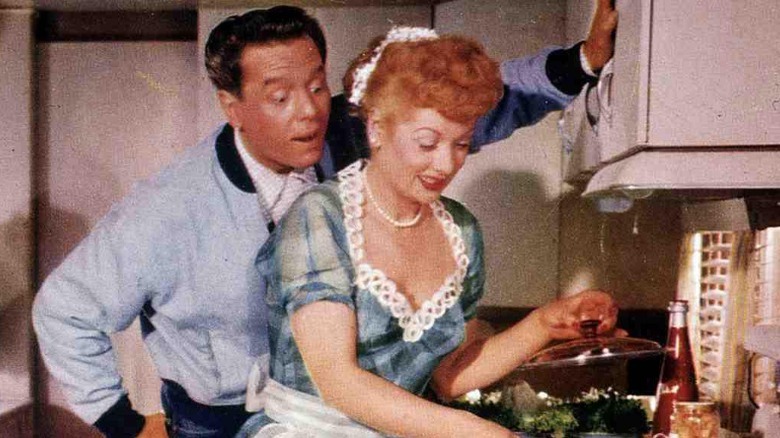Lucille Ball's Relationship With Desi Arnaz Explained
Since the 1950s, the Ricardo family from "I Love Lucy" has been the paragon of an ideal household for many families. While Lucy and Ricky didn't always see eye-to-eye and agree about everything, they were still an incredibly loving family who always cared for and took care of each other. Yet, while Lucy and Ricky's on-screen relationship was often portrayed as idyllic and picturesque, this masked the off-screen troubles that Lucille Ball and Desi Arnaz often struggled with.
Though their marriage lasted for 20 years and Arnaz and Ball had two children together, their relationship was just as often filled with happiness and laughter as it was with tumult and anger. Following their divorce in 1960, both Ball and Arnaz remarried within a few years to people who were their lifelong partners. Both of them, though now deceased, still live on in the hearts and memories of millions through syndicated episodes of "I Love Lucy." It might not have always been picture perfect, but this is Lucille Ball's relationship with Desi Arnaz, explained.
Lucille Ball and Desi Arnaz met filming a movie
In true Hollywood fashion, Lucille Ball and Desi Arnaz originally met while on a movie set. The year was 1940 and the movie was "Too Many Girls," a film about an eccentric heiress (played by Ball). She had just finished the movie "Five Come Back" and was in New York City doing a promotional tour (via Ball's autobiography, "Love, Lucy"). The studio urged her to see the stage version of "Too Many Girls," which starred a young Arnaz as a football player.
Upon seeing Arnaz on stage, Ball was immediately smitten with his good looks, charm, and comedic appeal. However, Arnaz's first impression of Ball went a little differently. Arnaz was already on set for "Too Many Girls" when Ball came in with smeared makeup and a black eye, looking completely disheveled (per Arnaz's autobiography, "A Book by Desi Arnaz"). Arnaz was taken aback by her appearance, thinking there was no way she would be a suitable leading lady for the film.
However, what Arnaz didn't realize was that Ball was already in makeup. She had actually just come from filming another film next door, "Dance, Girl, Dance," and she had just shot a scene that had her fighting someone. The black eye she was sporting was fake, and upon seeing Ball in costume on-set for their film, Arnaz was blown away. He could not even believe it was the same person, and he was immediately attracted to her.
They spontaneously drove from New York to Connecticut to elope
Lucille Ball and Desi Arnaz had a relatively short courtship, and they were married within a year of starting to date. As Arnaz explains in his autobiography, "A Book by Desi Arnaz," it was November 29, 1940, and he had just been reunited with Ball after being separated due to their busy work schedules. Arnaz came by to visit Ball at her hotel in New York City in between show breaks at the Roxy where he was performing.
While in the room, Arnaz heard Ball giving an interview where she was explaining why she and Arnaz would not be able to get married. Making every excuse in the book, she told the interviewer they were too busy and had separate lives. As soon as the interview finished, Arnaz told her the reporter's story was going to most likely flop, considering he had already arranged for them to get married in Connecticut.
As Ball explains in her autobiography "Love, Lucy," the article ended up being published under the title "Why I Will Always Remain a Bachelor Girl," yet she agreed to marry Arnaz and they immediately drove to Greenwich, Connecticut the next morning and eloped. Arnaz forgot the ring, so they had to use a brass one from the department store Woolworth's, which he eventually replaced with a platinum one. At the time, the relationship seemed off to a great start and they were both very happy.
They moved to a ranch to get away from Hollywood
Almost as soon as Lucille Ball and Desi Arnaz got married, they fled Hollywood for a place in the San Fernando Valley in California. According to her autobiography "Love, Lucy," Ball and Arnaz were on the same page from the beginning that it would be much easier to cultivate a happy and loving marriage if they kept some distance between themselves and the hustle and bustle of Hollywood. Ball wanted to settle down and focus on becoming domesticated, and after just six months of marriage, they bought a ranch.
Arnaz grew up living on ranches in his native Cuba, where his father owned several, and he immediately took to building a swimming pool and planting tree crops on their five-acre property. Arnaz and Ball were madly in love when they first moved in, and they even engraved "To Lucy, Love Desi" on all of her jewelry, as well as a message from Ball to Arnaz on his golden lighter.
They called the ranch Desilu, a portmanteau of their names. Yet, while they shared so much, one thing they did keep separate from the beginning was their finances. They kept separate accounts and had their business manager handle everything. This was largely because Ball was very fiscal with her money, while Arnaz preferred to make at times very extravagant purchases.
Their first years in marriage were tough at times
While at first, everything seemed perfect and quaint for Lucille Ball and Desi Arnaz when they moved into Desilu Ranch, the honeymoon did not last forever. They had their hands full keeping up with basic living expenses on their new property, and at times they quarreled over problems with their animals. Arnaz at times wanted to kill some of their livestock for food, which upset Ball and prompted her to call him a "murderous monster" (per Warren G. Harris in "Lucy and Desi: The Legendary Love Story of Television's Most Famous Couple").
Later in 1941, Ball experienced the first of several miscarriages, which affected both her and Arnaz deeply. They were also both struggling in their acting careers, and Ball even attempted to give Arnaz private acting lessons. In May 1943, Arnaz found himself drafted into the U.S. Army to fight during World War II. They both knew it was coming, and Ball was actually relieved because she thought it might help him cool his temper.
Arnaz ended up being stationed in Van Nuys, California to help provide entertainment for new recruits to the army, which was located relatively close to Desilu. According to Ball's autobiography, "Love, Lucy," Arnaz injured his knee while training, which prevented him from serving overseas. While it allowed him to stay in the safety of California, it also upset Arnaz that he could not fight overseas for his adopted country.
Lucille Ball filed for divorce in 1944, but they stayed together
Even though Desi Arnaz was stationed in Van Nuys, California during the war, which was just down the street from his Desilu ranch, his relationship with Lucille Ball continued to deteriorate. Arnaz began to have multiple affairs with numerous women while he was living on the army base, and would often visit mistresses instead of his wife while on leave (via Warren G. Harris in "Lucy and Desi"). Ball would find out about these liaisons through the tabloids, and in return began seeing other men in public.
Eventually, Arnaz stopped coming home completely by the summer of 1944, prompting Ball to file for divorce (via her autobiography "Love, Lucy"). However, Ball was still in love with Arnaz, and she wanted to give him time to work things out before anything was finalized. The divorce was never completed after they talked things over, and Arnaz's behavior markedly improved, at least for a time. Ball had longed to co-star with Arnaz in a movie, but after his discharge from the war, he began pursuing his first love as a band leader.
In 1949, Arnaz and Ball renewed their marriage vows, five years after their near-divorce and eight years after initially marrying (via Michael McClay in "I Love Lucy: The Complete Picture History of the Most Popular TV Show Ever"). They did so at a Catholic church, with Arnaz once again promising to clean up his act as a philanderer.
Desi Arnaz changed their daughter's name at the last second
In the spring of 1950, Lucille Ball and Desi Arnaz were hard at work trying to convince the executives at CBS to adapt the radio program she was starring on, "My Favorite Husband," into a TV series starring her and Arnaz together. According to Michael McClay's "I Love Lucy," while performing their vaudeville tour to impress the CBS executives, Ball experienced one of her several miscarriages that July. However, just a few months later, Ball and Arnaz found themselves expecting again.
The following summer in July 1951, nearly a year to the day of her miscarriage, Ball and Arnaz welcomed baby Lucie Arnaz to the family. Initially, they had agreed to name the baby Susan. However, Arnaz changed the name on the birth certificate to Lucie, which shocked and delighted Ball when she found out (via DeAnn Herringshaw's "Lucille Ball: Actress and Comedienne").
Just over six months later, in February 1952, Ball became pregnant again (per Nicholas Yapp's "Lucille Ball"). Her pregnancy was written into "I Love Lucy" as a major plot point, and their son was born on the same day as an episode of the show aired. On the show, he was Ricky Jr., but in the Ball-Arnaz household, he was Desi Arnaz Jr.
They starred together on I Love Lucy to save their marriage
Before Lucille Ball became one of the biggest international TV stars of the 1950s, she struggled at times to find herself on screen. Between 1948 and 1950, she starred on the radio program "My Favorite Husband," which saw pretty good success, according to Michael McClay's "I Love Lucy." Yet, in 1950, Ball wanted to take "My Favorite Husband" from the radio to the screen. She wanted to do this because not only was it more lucrative, but she also saw it as a way to help them save her marriage to Desi Arnaz.
It was around this time that they renewed their vows with each other, with Arnaz promising to change his philandering ways. It seemed like a perfect package at the time, where Ball and Arnaz would be together both on-screen and off, and they could keep their marriage going. Of course, neither of them could have foreseen the incredible hit that "I Love Lucy" would turn into. The show ran from 1951 to 1957, producing 180 episodes over six seasons and becoming one of the most beloved shows in American TV history (via Rotten Tomatoes). Like their characters Lucy and Ricky, Ball and Arnaz stayed together during the show's entire run.
Desi Arnaz stood by Lucille Ball during tough times
In 1936, when Lucille Ball was in her mid-20s and before she met Desi Arnaz, she made a seemingly harmless decision. According to her autobiography "Love, Lucy," a family friend was running for the city council office that year, and she registered as a member of the Communist party in order to vote for him. Ball registered as a communist to appease her father, and it had nothing to do with the party's politics or ideology.
In 1940, she gave vocal support to two colleagues who were accused of being communists, which sparked the revelation of her 1936 registration. Things stayed mostly silent until 1953 when she was ordered to appear before the infamous House Un-American Activities Committee. She denied any communist affiliation, but the press got word of it and accused her of being a communist. While this might not seem like a big deal now, at the height of the Cold War with Russia, it could have devastated her reputation.
Ball and Arnaz were preparing to film the inaugural episode of "I Love Lucy," and the scandal threatened to end the show before it even started. However, Arnaz stood by Ball and gave a rousing and emotional speech to the studio audience, winning them over. Arnaz himself was enraged over the accusations, particularly because, as he noted in his autobiography "A Book by Desi Arnaz," his family had struggled against the Bolsheviks in his native Cuba in the 1930s.
Desi Arnaz's alcohol use drove a wedge between them
As Lucille Ball and Desi Arnaz continued to enthrall audiences with their image as the Ricardo family on "I Love Lucy," off-screen things began to deteriorate as time went on. One of the biggest factors in their relationship's decline was Arnaz's unhealthy use of alcohol. As Coyne Steven Sanders explains in "Desilu: The Story of Lucille Ball and Desi Arnaz," his alcohol use became so severe that it started to hurt his performance on the show, leading to Ball becoming more and more upset.
Years later, even his daughter could feel the pain that it caused the family and her mother, and it also led to Arnaz's increasing infidelity. He started to gamble more, which Ball did not approve of. According to Desilu productions executive Martin Leeds (via Michael McClay's "I Love Lucy"), Arnaz somewhat resented the fact that Ball was the ultimate star of the show at his expense. As the show and Ball became more successful, his drinking increased in tandem, along with the disintegration of their relationship.
If you or anyone you know needs help with addiction issues, help is available. Visit the Substance Abuse and Mental Health Services Administration website or contact SAMHSA's National Helpline at 1-800-662-HELP (4357).
Lucille Ball filed for divorce the last day they worked together
By the end of the 1950s, after the original "I Love Lucy" show had ended and Lucille Ball and Desi Arnaz had shifted to shooting one-hour specials, it was clear the relationship had run its course. As Ball recalls in her autobiography, "Love, Lucy," Arnaz was constantly under the influence of alcohol and they were always fighting. It got to the point where they just stopped speaking to each other, and Ball realized that they were probably not the greatest fit as a couple in the first place.
They had wildly different ideas about social life, with Ball being far more conservative than the over-the-top Arnaz. She made the decision to divorce him in late 1959, and on March 3, 1960, she filed for divorce again — this time for good. Arnaz had been the one to ask her, as Ball found herself unable to end the relationship herself. They were actually filming a scene on the day she filed for divorce, and that would prove the final time they would work together professionally (per Nicholas Yap's "Lucille Ball"). Like she did in 1944, Ball cited "extreme mental cruelty" when she filed for divorce. After years of embarrassment and emotional distress, it was just too much for her to put up with Arnaz anymore.
Desi Arnaz called Lucille Ball Lucy out of jealousy
Today, the "I Love Lucy" TV show name is so iconic and recognizable that most people ignore the fact that the star actress always went by the name Lucille Ball instead of Lucy. As Desi Arnaz explained in his autobiography, "A Book by Desi Arnaz," the reason for this is actually much darker than you might think. Even though Arnaz constantly philandered and had numerous affairs while he was married to Ball, he was incredibly possessive.
Arnaz actually refused to call her by the name Lucille and started using Lucy within just a few months of their dating. For some reason, Arnaz was upset that other men Ball had previously dated had called her by her name, and he wanted to use Lucy because he felt that it made it special and unique to their relationship. Unfortunately, Arnaz's jealousy over other suitors did not translate into him becoming a reliable and trustworthy husband himself.
They last spoke on their 46th anniversary
Throughout their 20-year marriage, Lucille Ball and Desi Arnaz had a lot of ups and downs. Even though they ended up getting divorced, they still shared many years of love and companionship by each other's side. Following their divorce, both of them remarried: Arnaz to Edith Mack Hirsch and Ball to Gary Morton. In 1985, Hirsch died of cancer, and the next year, Arnaz himself was diagnosed with lung cancer (via Coyne Steven Sanders' "Desilu"). Ball found out about his diagnosis when she called to wish him a happy 69th birthday and was devastated by the news.
Though they initially were estranged leading up to and following their divorce, their feelings softened in the decades since and they managed to retain a friendship (via DeAnn Herringshaw in "Lucille Ball"). The last time they spoke was November 30, 1986, exactly 46 years after they had initially married. As one of the very last people Arnaz ever talked to, Ball's final words to Arnaz before his death were heartbreaking: they both told each other that they loved each other. He died two days later on December 2, and Ball was one of the few to attend his funeral.
